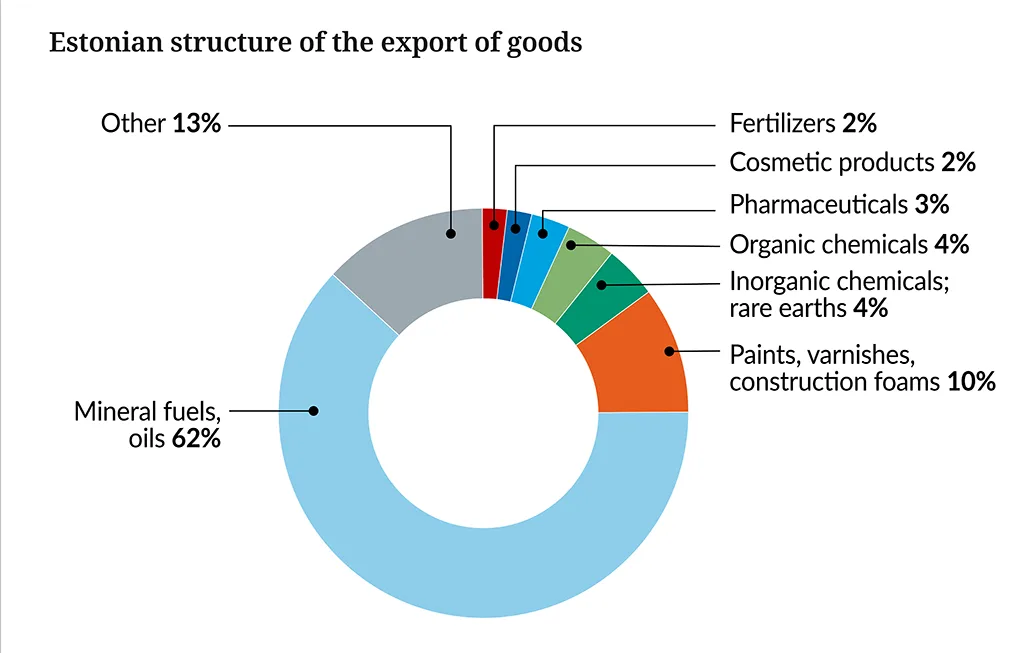Chemical industry snapshot
The Estonian chemical industry is a small but export-oriented, well-established, and specialised sub-sector of Estonian industry. According to the Estonian Statistics Office 2022 data’s, the total number of industry companies in Estonia is approximately 10292. Among those, there are 153 companies in the chemical industry. The number of employees in the chemical industry is approx. 2445 accounting for 3.6% of the number of people employed in the processing industry. In the same comparison, chemical industry exports account for 5.9% of processing industry exports.
81.2% of sales went for export (export 592.9 million euros). The sales revenue of companies fell in -27.4% compared to the same time last year by the 2023 short-term statistics. Labor productivity (net added value per person employed) was 30.6 thousand euros.
In 2022 5 companies operated in the field of production of coke and refined petroleum products. 42.7% of sales went to export (export 179.6 million euros). Based on short-term statistics, the sales revenue of companies fell by -11.0% in the period 2023 compared to the same time last year. Labor productivity (net added value per person employed) was -18.4 thousand euros.
The main (related) areas of the Estonian chemical industry are: production and sale of chemical substances (raw materials) (e.g. benzoic acid, rare earth metals); production and sale of shale oil and Chemicals production and sale of cosmetics and natural cosmetics, production and sale of washing and cleaning chemicals, car and household chemicals, production and sale of construction chemical products (paints, varnishes, adhesives, production and sale of polyurethane foams, distribution and wholesale of chemical raw materials and transport of chemicals.
It must be noted that the Estonian Ministry of Economy considers under chemical industry oil products, chemicals and pharmaceuticals (NACE 19, 20 and 21). Plastic and rubber sector is viewed separately. Traditionally, the export share of Estonian chemical companies in sales has been high, over 80% on 2021. At the same time, this record primarily reflects the changes in the sales of shale oil, where instead of domestic intermediaries, products move directly to foreign markets. These markets include Lithuania, Latvia, Finland, USA, Netherlands, Sweden, Germany, Poland Denmark, China, Norway. The chemical industry has a high growth potential and is one of the most competitive industry sectors in Estonia. Based on turnover, the productivity and output rate per worker are among the highest compared to other industry sectors.

Situational analysis of the chemical industry
The Estonian chemical industry is characterised by strong territorial concentration, as more than half of the chemical industry is located in one county: East-Viru. This results from tradition and development possibilities of that region.
Two important chemical sub-sectors are characteristically specific to the Estonian chemical industry: oil shale chemistry and the production of rare earth metals and their oxides. Industrial production of Estonian shale oil started in 1924. Producing oil from oil shale is a long-term tradition in Estonia, but a unique process in Europe. It makes a remarkable contribution to the economy of the country.
Export success comes mostly from the East-Viru county, where the main export articles are shale oil and – phenols, benzoic acid, sodium benzoate, and plasticizers, rare earth metals and their oxides; production of urea fertilizers has ceased.
Producers of construction chemicals, namely sealants and construction adhesives, play a big role in chemical product exports. Export volumes of applied chemistry are more modest, but Estonia has a long experience in producing cosmetics and applied chemistry such as home care products.
The Estonian chemical industry co-operates closely with research institutions, as the main universities in Estonia engaged in offering chemical and engineering education have appointed representative facilities that are direct ECIA members.
How are we doing?
Strengths
- Success in niche markets
- Unique experience and knowledge as the only European manufacturer of rare earth metals and their oxides
- Leading producer of polyurethane foams globally
- Unique natural resource in the form of oil shale and concentrated, unmatched know-how in shale oil production
- Good quality-cost relationship of the workforce
Challenges
- High and increasing energy prices; no incentives for energy-intensive industries.
- Lack and/or fragmented structure of support to SMEs to ensure that the growing regulatory burden does not hurt their competitiveness and that access to competence in R&D – intensive industry branches is available for SMEs
- Estonian model of creating added-value places a relatively large burden on the environment in terms of CO2 efficiency and material productivity
- EU Green Deal initiative places unprecedented challenges on the future of shale oil and related fine chemicals sector.
The chemical industry is a suitable industry for Estonia because:
- the turnover is high and the required human resources are small (good theoretical and practical training of employees is necessary);
- it cannot be easily moved from one country to another – emerging companies stay in Estonia;
- it remains especially stable in Estonia, if it uses local raw materials: oil shale, wood and phosphorite.
- the pandemic crisis is changing the geography of the chemical industry in the world: European and US companies are starting to bring production back from China and India to ensure their economic independence and the continuity of the necessary supplies.
- the continuation and further development of the use of oil shale in Ida-Virumaa is necessary for Estonia
- The use of oil shale is still socially, economically and strategically important for Estonia
- due to the overproduction of oil in the world and low oil prices, the construction of an additional oil shale oil production plant is not reasonable at the moment: two oil plants are already standing
- oil production will continue to depend on the relatively stable price of oil on the world market,
Our contribution to a competitive Europe
In order to implement the action plan of the Estonian Green Paper on Industrial Policy, the Ministry of Economic Affairs and Communications has launched the Industry 2030 Cooperation Council, which coordinates the future activities of industrial policy and their implementation. The purpose of the Green Paper on Industrial Policy is to identify bottlenecks in the industrial sector and to provide solutions for the implementation of coordinated policies. It is based on the principle of inclusive policy-making and previous discussions started already in 2016.
The Green Paper on Industrial Policy agreed on 6 indicators on the basis of which to measure the effectiveness of co-operation between the state, industrial companies and the professional associations representing them in promoting the competitiveness of Estonian industry. The Ministry was also tasked with setting up an industrial policy expert group and coordinating its work.
The panel of experts includes companies nominated by industry professional associations at the level of a member of the board and top managers of the most important ministries from the point of view of industry. ECIA is well represented in this panel and works towards the improvement of the competitiveness of industry.
Present and Future Prospects
Due to the depth of scientific research on oil shale and resources of good quality oil shale, this branch of industry has been previously identified as one of the key sectors for the development of the Estonian economy.
Transformation of mineral resources or oil shale in the chemical industry was selected under the Smart Specialization initiative as one of the growth niches in the growth field of materials technologies.
The growth niche of oil shale in the chemical industry involves, the production of products with higher added value from oil shale oil and by-products (waste gas, ash), as well as design and development of relevant technologies.
In order to cope with the increasingly stringent local and European Union environmental ambitions such as the Green Deal and the transition to climate neutral economy and to ensure a competitive chemical industry for Estonia, a supportive economic environment and investment solutions are needed.
Socially Fair Transition to a Green Economy
EU´s Just Transition Mechanism aims to support the regions most affected by the transition to climate neutrality from the EU’s long-term budget 2021–2027. In Estonia, this applies primarily to Ida-Viru County. Estonia stands for the balanced treatment of the oil shale sector in the EU. The objective of the Fair Transition Fund to be established in Estonia is to support the transfer of the oil shale sector – both industry and jobs – to more sustainable activities. It is not aimed at shutting down oil shale mining and the related industries, but intended to support the transition to a cleaner environment and a more sustainable economy.
In the future, the fund can provide support for retraining and refresher training, for improving the living environment for locals, and for investments based on cleaner technologies. Production of oil shale-based electricity will not stop overnight but over a relatively long transition period. However, adding value to oil shale in other ways will continue in the future.
Additionally, there is a need for the preservation and development of the scientific potential of chemistry; preparing and educating needed chemists and specialists on chemical safety; and development activities of the chemical industry through new technologies and processes. These measures would ensure the preservation of production and export capability of chemicals and chemical products, and would improve the employment situation. It is necessary to acknowledge the key role of the chemical industry as a developer and enabler of “traditional” and “new, potentially bio-based, economy” in Estonian society. It is impossible to develop the economy and a whole society without knowledge of chemistry and the chemical industry.
Moving away from fossil fuels presents a new and unprecedented technological challenge to mankind – where the resource will come from for the transition to new electric transport, solar and wind farms and widespread digitalization.














